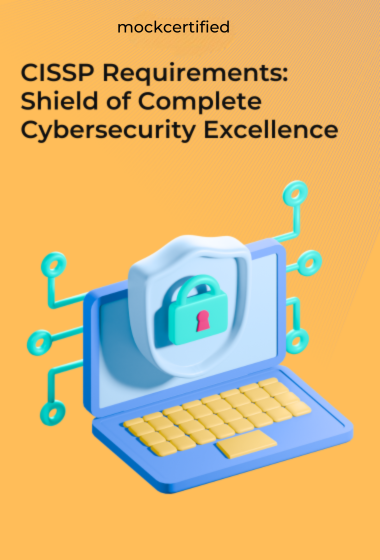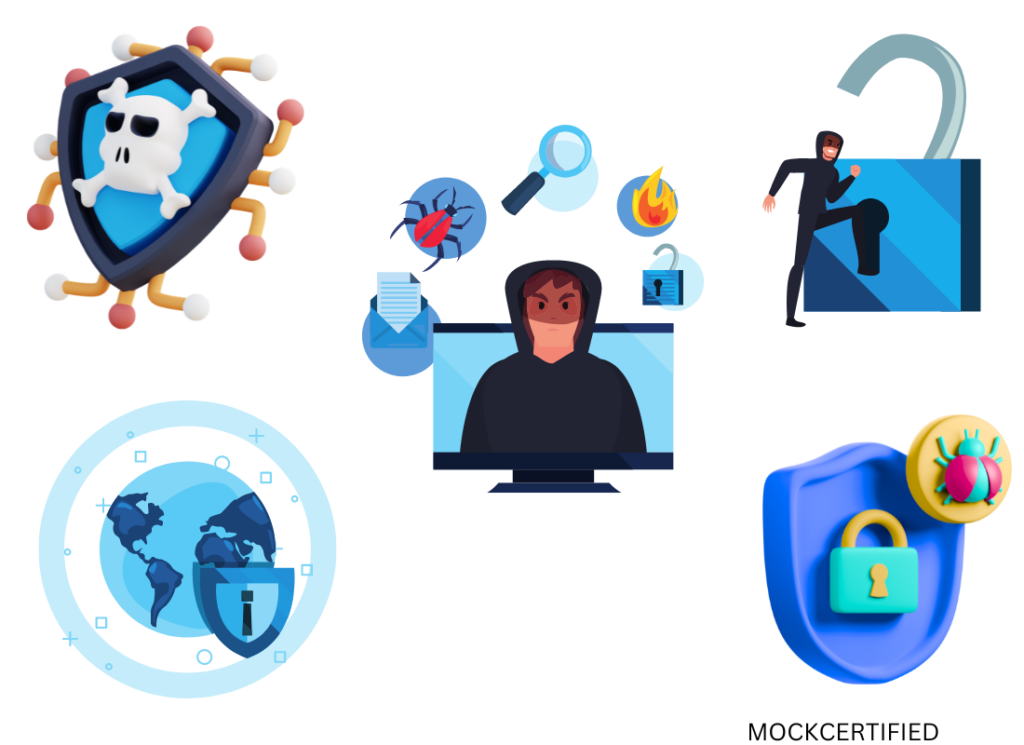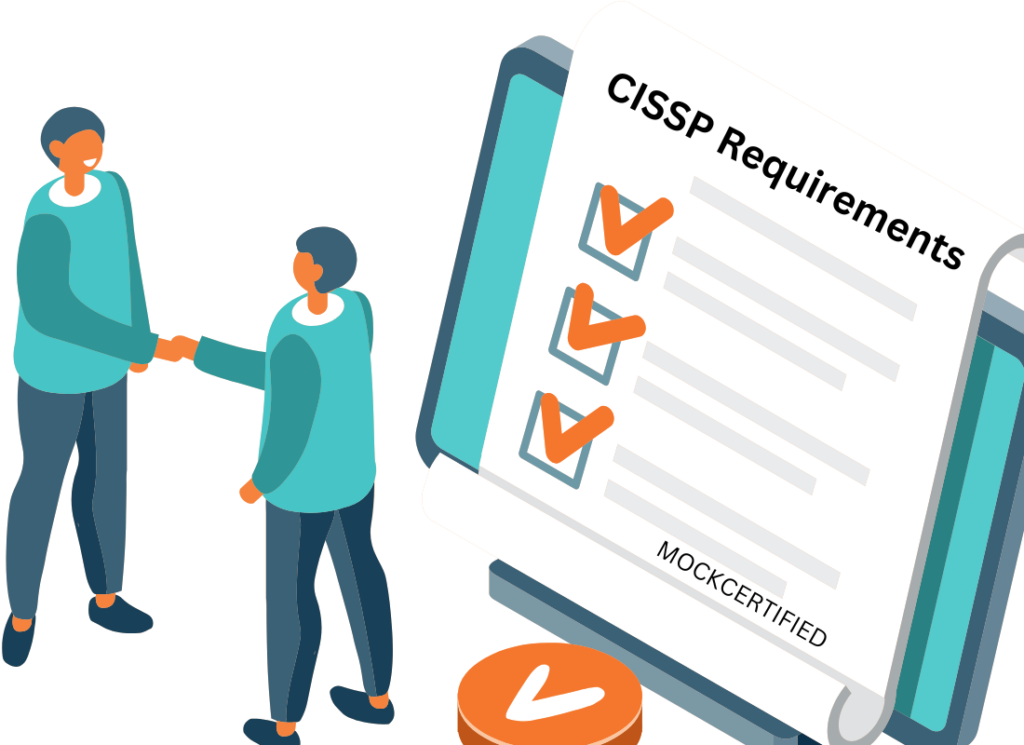Blog
CISSP Requirements: What You Need to Know in 2025!
Sara Ali
May 2, 2023
5 min read

Table of Contents
According to Cybersecurity Ventures, global cybercrime damages are expected to hit $10.5 trillion annually by 2025, making cybersecurity a top priority for both organizations and individuals. In 2024 alone, more than 3,158 data compromises were reported, impacting over 1.35 billion people worldwide.
As a result, the field of cybersecurity has become not just important but critical. Organizations and individuals are actively seeking trained professionals who can confidently deal with the complexities of digital security and defend against these evolving threats. With a global job openings of over 3.5 million cybersecurity professionals (2023), there’s a growing demand for certified experts.
The Certified Information Systems Security Professional (CISSP) credential, issued by the International Information System Security Certification Consortium (ISC)², is one of the most respected certifications in the cybersecurity field. CISSP-certified professionals earn an average of $126,000 per year in the U.S., making it both a prestigious and rewarding qualification.
Want to be a part of this amazing industry? Keep reading!
Introduction to CISSP
Definition of CISSP
CISSP stands for Certified Information Systems Security Professional. It is a worldwide recognized credential that verifies cybersecurity professionals’ knowledge and abilities in planning, executing, and managing information security programs. CISSP certification is awarded by the ISC², a renowned organization that sets the standard for information security certifications.
Importance of CISSP Certification
Who Makes Sure Your Facebook Data Doesn’t Land on a Hacker’s Laptop?
That’s the job of a CISSP-certified professional.
When you log in, share a photo, or make a payment online, someone has already put systems in place to make sure that data doesn’t leak or get stolen. Behind the scenes, CISSP professionals are the ones locking down sensitive info and patching up any holes before attackers can slip through.
The CISSP certification says, “I know how to protect critical data.” It’s trusted across industries, from big tech companies to banks and healthcare networks. And yes, it can seriously boost your salary and job options.
Want to check other IT certification that are high in-demand right now? Click here!
What is CISSP Certification?

The CISSP certification is a globally recognized credential that validates cybersecurity professionals’ skills and knowledge in areas such as security and risk management, asset security, security architecture and engineering, communication and network security, identity and access management, security assessment and testing, security operations, and software development security.
Who Should Pursue CISSP Certification?
CISSP is perfect for people who already have experience in cybersecurity and want to take their skills to the next level. If you’ve been working in the field for at least five years and have hands-on experience in two or more of the eight CISSP domains, this certification could be a great fit for you.
It’s especially valuable for professionals like security consultants, IT managers, and those aiming for roles like Chief Information Security Officers (CISOs). If you’re ready to deepen your knowledge and take on more responsibility in securing sensitive information, the CISSP can help open up new career opportunities.
CISSP Requirements

Eligibility Criteria for CISSP Certification
To be eligible for CISSP certification, candidates must meet certain criteria set by ISC². The minimum CISSP requirements include:
- Five years of cumulative, paid work experience in two or more of the CISSP domains, or four years of work experience with a relevant college degree, or an approved credential from the CISSP Prerequisite Pathway.
- Passing the CISSP exam, which consists of 100-150 multiple-choice and advanced innovative questions, testing the candidate’s knowledge and expertise in the eight CISSP domains.
- Agreeing to abide by the ISC² Code of Ethics and completing the endorsement process, which requires the candidate to be endorsed by an existing CISSP, or other approved professional, who can verify the candidate’s professional experience.
How Much Can You Earn as a CISSP?
Here’s an average idea of what CISSP-certified professionals make (based on region) but also remember that these numbers can vary based on your location, company and more:
| Country | Average Salary (USD) |
|---|---|
| United States | $120,000 – $160,000 |
| Canada | $90,000 – $120,000 |
| India | $25,000 – $40,000 |
| UK | $80,000 – $110,000 |
| UAE/Saudi Arabia | $70,000 – $100,000 |
CISSP Exam Details
As of April 2024, the CISSP exam uses a Computerized Adaptive Testing (CAT) format (for English-language test-takers), which adjusts question difficulty based on your performance.
- Number of Questions: 100 to 150
- Time Limit: 3 hours
- Passing Score: 700 out of 1000
- Format: Multiple choice & advanced innovative questions
The exam will end early if it determines with 95% confidence whether you’ve passed or failed; you may not reach all 150 questions.
CISSP Domain Weightings (Effective April 2024)
The CISSP exam covers 8 domains from the (ISC)² Common Body of Knowledge (CBK). The domain weightings were updated to reflect evolving industry trends:
| Domain | Weight (%) |
|---|---|
| 1. Security and Risk Management | 16% |
| 2. Asset Security | 10% |
| 3. Security Architecture and Engineering | 13% |
| 4. Communication and Network Security | 13% |
| 5. Identity and Access Management (IAM) | 13% |
| 6. Security Assessment and Testing | 12% |
| 7. Security Operations | 13% |
| 8. Software Development Security | 10% |
Continuing Professional Education (CPE) Requirements
Once an individual acquires CISSP certification, they are further required to maintain their certification through continuing professional education (CPE) requirements.
CISSP-certified professionals must earn and submit a minimum of 40 CPE credits annually, with a total of 120 CPE credits required over a three-year certification cycle. Attending conferences, participating in webinars, writing articles, and engaging in other professional development activities relating to information security can help you earn CPE credits.
Preparing for CISSP
Preparing for the CISSP exam requires dedication, time, and effort. Here are some steps to help candidates prepare for the exam:
Understand the CISSP domains: Familiarize yourself with the eight CISSP domains and their respective knowledge areas. Review the CISSP Common Body of Knowledge (CBK) to gain a thorough understanding of the exam topics.
Create a study plan: Develop a study plan that suits your schedule and allows you to cover all the CISSP domains in a systematic manner. Set realistic goals and allocate time for studying, reviewing, and practicing.
Utilize study materials: Choose reliable study materials, such as CISSP textbooks, study guides, online resources, and practice exams. Ensure that the materials are up-to-date and aligned with the latest CISSP exam objectives.
Practice with mock exams: Taking practice exams to familiarize yourself with the exam format, types of questions, and time management will help you analyze your performance and identify areas that need improvement.
Review regularly: Review your study materials regularly to reinforce your understanding of the CISSP domains. Focus on areas where you may be weak and seek additional resources or guidance if needed.
Stay updated with industry trends: Stay informed about the latest trends, best practices, and technologies in the field of information security through industry publications, websites, and forums.
Manage exam day stress: Practice relaxation techniques and ensure you get enough sleep before the exam day. Arrive early at the exam center and carry all the required documents and identification.
Benefits of CISSP Certification
Obtaining CISSP certification can bring numerous benefits to professionals in the field of information security. Some of the key advantages include:
Career advancement: CISSP certification is widely recognized and respected in the industry, and it can open up new career opportunities, such as higher-level security roles, management positions, and consulting engagements.
Higher earning potential: CISSP-certified professionals typically command higher salaries compared to non-certified peers due to their specialized skills and expertise.
Industry recognition: CISSP certification demonstrates your commitment to the information security profession and showcases your competency and credibility to employers, clients, and peers.
Enhanced knowledge and skills: Preparing for the CISSP exam requires in-depth study of the CISSP domains, which enhances your knowledge and skills in various areas of information security.
Networking opportunities: CISSP certification provides access to a global community of information security professionals, allowing you to network, share knowledge, and learn from industry experts.
Recommended Study Materials
- ISC2 Official Community:
A goldmine for peer support, exam tips, and real-world advice from CISSP-certified professionals. - ISC2 Official Study Guide, 10th Edition by Mike Chapple:
This is known as one of the most reliable and structured guides aligned with the current exam format. - Sprintzeal.com:
Offers instructor training, practice tests, and flexible online programs for CISSP aspirants. - ThorTeaches.com:
A popular platform, it includes video courses, flashcards, practice questions, and exam tips—great for visual learners. - Destination Certification:
Known for their mind maps and well-structured study guides that simplify complex topics. - Reddit (r/cissp):
This community can help you with questions or help related to CISSP, with no textbook answers. People can share honest feedback, resource reviews, and strategies that worked well with them.
Is CISSP Beginner-Friendly?
CISSP is definitely not beginner-friendly. This certification is built for professionals with years of experience in the field of cybersecurity. While there isn’t a hard rule for the number of years you need, having at least five years of hands-on experience across two or more of the CISSP domains is ideal.
Why? Because CISSP dives deep into complex areas like risk management, cryptography, and security architecture—topics that require a practical understanding of how security operates in real-world environments. If you’re just starting out, these concepts will feel a lot like trying to run before you can walk.
So, what should you do instead if you’re new to cybersecurity? It’s better to build up to CISSP. Start with foundational certifications like CompTIA Security+ or Certified Ethical Hacker (CEH).
These will give you a good grasp of basic concepts and give you a practical understanding of the field. Once you have some hands-on experience and are comfortable with core security principles, then you can begin thinking about CISSP.
Is CISSP Permanent?
No, CISSP is not a one-and-done deal. It’s a certification you need to maintain. To keep your CISSP credential active, you’re required to earn Continuing Professional Education (CPE) credits.
You’ll need a minimum of 40 CPE credits every year and 120 credits over a three-year period to stay certified. This helps ensure that you stay up to date with the constantly evolving field of cybersecurity.
You can earn CPE credits through a variety of activities—anything from attending security training sessions, going to industry conferences, publishing articles, or participating in other professional development activities that relate to information security.
CCNA: One of the CISSP Requirements?
No, you don’t need the CCNA certification to get CISSP.
CISSP is much broader, covering general information security topics, while CCNA is all about networking. You don’t need to be a networking expert to pass CISSP.
That said, having a basic understanding of networking can help, especially in areas like network security. But CCNA itself isn’t a must-have to pursue the CISSP.
Conclusion
CISSP certification is a very valuable credential for experienced professionals who are looking to advance their careers in the field of information security. It requires meeting certain eligibility criteria, passing a comprehensive exam, and fulfilling continuing education requirements.
CISSP Requirements includes: Proper preparation, including understanding the CISSP domains, creating a study plan, utilizing study materials, practicing with mock exams, and staying updated with industry trends, can increase your chances of success.
Obtaining CISSP certification can bring benefits such as career advancement, higher earning potential, industry recognition, enhanced knowledge and skills, and networking opportunities.
To check out certifications and career options, check out these amazing blogs!
Can CISSP Certification Help Enhance Collaboration Between IT and Non-IT Departments?
Absolutely! The CISSP certification can play a vital role in fostering collaboration between IT and non-IT departments within an organization. By obtaining the CISSP certification, professionals gain a comprehensive understanding of information security principles and practices, enabling them to effectively communicate and bridge the gap between technical and non-technical teams.
Can I Take the CISSP Exam if I’m Not a Full-Time Employee?
Yes, you can take the CISSP exam even if you’re not a full-time employee. The certification is open to professionals in various employment arrangements, including part-time employees, independent consultants, and freelancers. What matters most is your knowledge, skills, and experience in information security. The CISSP certification recognizes expertise regardless of employment status, as long as you meet the other requirements and pass the exam.
Can I Pursue the CISSP Certification if I Have a Non-Technical Background?
Absolutely! While a technical background can be advantageous, the CISSP certification is designed to encompass a wide range of information security domains. It values diverse perspectives and encourages professionals from various backgrounds, including business, law, and management, to pursue the certification. The key is to have a solid understanding of information security principles and the ability to apply them in real-world scenarios.
Share this post
Popular
Get the most out of the hot topics with our favorite blogs!